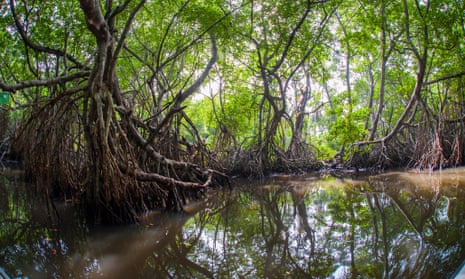More than half the world’s mangroves have been lost over the last century but all of those surviving in Sri Lanka, one of their most important havens, are now to be protected in an unprecedented operation.
The organiser of the project, the biggest of its kind, see the role of women as the key to its success.
Mangroves are an important protection against climate change as they sequester up to five times more carbon than other forests, area for area. They protect coastlines against flooding, including tsunamis, and provide vital habitat for marine animals, especially crabs, shrimp and juvenile fish.
In an initiative designed to prevent any more being cut down in Sri Lanka and to boost some of the poorest communities in the world, women will be offered small loans and training to start businesses.
In return for the microloans, 15,000 women – including thousands of widows from the civil war - will be expected to stop using the trees for firewood and to guard the forests near their homes.
Conservationists behind the scheme, which is backed by the Sri Lankan government, believe the focus on the women will bring huge benefits to living standards in coastal communities.
Moreover, they are convinced it is the most effective way to get the coastal communities to care for their mangroves instead of hacking them down for firewood.
“We have discovered that if you want a project to succeed, have the women of the community run it,” said Anuradha Wickramasinghe, chairman of the Sri Lankan NGO Sudeesa. “Other conservation organisations have found the same thing.
“It’s in our culture. The mother is the central. Even in my own family, my mother and my wife, it’s the same.
“Maybe we [the men] are doing other things but the women build up the family. They want to build up the family economy. The fishermen go to sea and bring back the catch. They are getting the money. That money is controlled by the women.”
The £2.2m initiative announced on Tuesday is designed to save mangroves covering 21,782 acres (8,815 ha) in 48 lagoon systems and involves women from 1,500 communities. A further 9,600 acres (3,885 ha) will be replanted.
Women involved in the scheme will protect mangroves by ensuring no one in their communities, or from outside, cuts down the trees. If persuasion does not work they will be able to alert the authorities who are providing legislative support.
Sri Lanka will be the first nation in the world to protect all its mangroves. The scheme is a partnership between the US-based conservation organisation Seacology, the Sri Lankan government and Sudeesa.

Comments (…)
Sign in or create your Guardian account to join the discussion